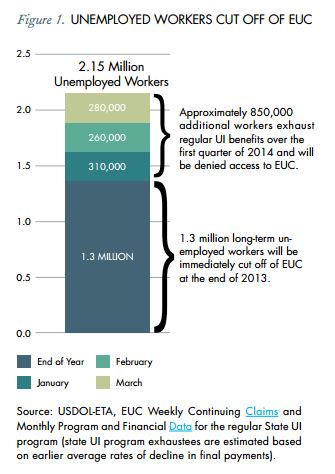More Than Two Million Unemployed Workers Will Lose Jobless Aid by Early 2014 if Congress Allows Federal Benefits to Shut Down at Year's End
 In the wake of October’s harmful government shutdown, the nation now faces another critical deadline: the looming December 31st shutdown of federal unemployment insurance for more than two million long-term unemployed workers.
In the wake of October’s harmful government shutdown, the nation now faces another critical deadline: the looming December 31st shutdown of federal unemployment insurance for more than two million long-term unemployed workers.
If Congress fails to reauthorize the federally-funded Emergency Unemployment Compensation (EUC) program, more than two million unemployed workers will lose federal jobless aid by the end of March, according to a new report from the National Employment Law Project.
That total consists of 1.3 million workers currently receiving federal EUC who will be abruptly cut off in the week between Christmas and New Year’s, and an additional 850,000 workers who will run out of state unemployment insurance in the first three months of 2014, with no access to federal EUC if Congress fails to act. (See Figure 1, below.)

The report provides a clear picture of key labor market measures showing a still-inadequate employment recovery amidst acute levels of long-term unemployment:
- The percentage and number of prime-age workers (age 25 to 54) with a job – key indicators of the ability of the economy to generate sustained higher rates of growth – are both still far below pre-recession levels for the last two recessions and have shown virtually no improvement in the last year.
- The number of long-term unemployed workers in September 2013 – 4.1 million – is still higher than in any month during the Great Recession.
- The share of jobless workers who are long-term unemployed (i.e., out of work for six months or more) – currently 36.9 percent – remains near the historic highs of the last three years.
- At 36.9 weeks in September 2013, the average duration of unemployment is still more than 20 weeks longer than pre-recession levels and only 1.2 weeks less than in December 2012.
- Federal cuts and the sequester have already reduced benefits to large numbers or workers. Since March 2012, the average number of long-term unemployed receiving EUC benefits has declined 50 percent, twice the rate of decline in the number of long-term unemployed workers. And those workers who are collecting benefits are receiving far fewer weeks of assistance and reduced weekly checks (recently averaging less than $260 per week).
Job growth has continued to be inadequate and hiring remains weak. At the current rate of job growth it will take until 2021 to return to the pre-recession unemployment rate.
The federal EUC program was first enacted in June 2008, when the national unemployment rate stood at 5.6 percent. Since then it has been reauthorized, expanded or amended 11 times – most recently in the January 2, 2013 “fiscal cliff” agreement. EUC benefits are paid to eligible unemployed workers who suffer involuntary job loss through no fault of their own and who are unable to secure new employment by the time their regular state unemployment insurance benefits end.
With nearly half of all regular state benefits recipients still looking for work when that state aid ends, a failure to renew federal EUC would leave these unemployed job-seekers without the modicum of income support that helps them feed their families, keep the lights on at home and heat their houses in winter.
“Congressional failure to help boost growth through much-needed investments in job-creation, education and infrastructure already borders on economic malpractice,” said Owens. “Brinksmanship, harmful cuts and budget sequestration have only made matters worse. But cutting off federal unemployment insurance would be tantamount to malfeasance, further compounding the damage to millions of struggling families, communities and the economy overall. Congress needs to simply do the right thing and renew the federal EUC program for 2014.”
Issue Brief:
More Than Two Million Unemployed Workers Will Lose Jobless Aid by Early 2014 if Congress Allows Federal Benefits to Shut Down at Year's End
The National Employment Law Project is a non-partisan, not-for-profit organization that conducts research and advocates on issues affecting low-wage and unemployed workers. For more about NELP, visit www.nelp.org.